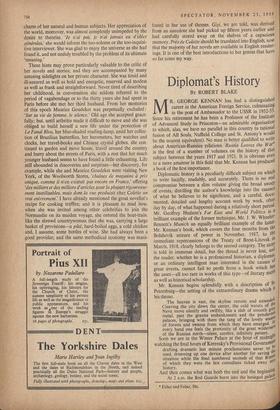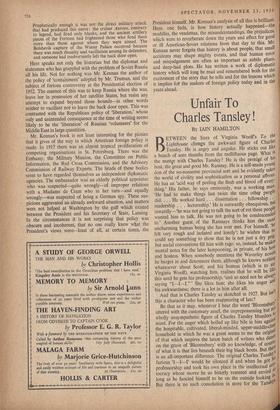Diplomat's History
BY ROBERT BLAKE MR. GEORGE KENNAN has had a distinguished career in the American Foreign Service, culminating in the post of Ambassador to the USSR in 1952-53. Since his retirement he has been a Professor of the Institute of Advanced Study in Princeton—an admirable organisation to which, alas, we have no parallel in this country (a rational fusion of All Souls, Nuffield College and St. Antony's would be the nearest equivalent). No man is better qualified to write about American-Russian relations. Russia Leaves the War* is the first of a number of volumes on the history of that subject between the years 1917 and 1921. It is obvious even to a mere amateur in this field that Mr. Kennan has produced a book of the first importance. Diplomatic history is a peculiarly difficult subject on which to write lucidly, readably, and accurately. There is no real compromise between a slim volume giving the broad sweep of events, distilling the author's knowledge into the essence of what he believes to be significant, and a careful. docu• mented, detailed and lengthy account week by week, often day by day, of what happened during a relatively short period. Mr. Geoffrey Hudson's Far East and World Politics is a brilliant example of the former technique, Mr. J. W. Wheeler' Bennett's Munich an equally brilliant example of the latter. Mr. Kennan's book, which covers the four months from the Bolshevik seizure of power in November, 1917, to the immediate repercussions of the Treaty of Brest-Litovsk in March, 1918, clearly belongs to the second category. The stall' is told in immense detail, but the thread is never lost, and the reader. whether he is a professional historian, a diplomat. or an ordinary intelligent man interested in the causes of great events, cannot fail to profit from a book which has the asset—all too rare in works of this type—of literary merit as well as historical scholarship. Mr. Kennan begins splendidly with a description of 5 Petersburg—the setting of the extraordinary drama which his theme. The heaven is vast, the skyline remote and extended. Cleaving the city down the center, the cold waters of the Neva move silently and swiftly, like a slab of smooth grey metal, past the granite embankments and the ponderous palaces, bringing with them the tang of the lovely wastes of forests and swamp from which they have emerged. At every hand one feels the proximity of the great wilderness of the Russian north—silent, sombre, infinitely patient. Soon we are in the Winter Palace at the hour of midnight watching the final hours of Kerensky's Provisional Government drafting dramatic last minute proclamations never to to used, dreaming up one device after another for saving the situation while the final numbered seconds of that Russ fl of which they were the last custodians ticked away into history. And then comes what was both the end and the beginning' At 2 a.m. the Red Guards burst into the besieged palace' ...
* Faber and Faber, 50s.
is Prophetically enough it was not the direct military attack that had produced this move : the cruiser Aurora, contrary to legend, had fired only blanks, and the ancient artillery pieces of the Fortress had frightened those who fired them more than those against whom they were aimed. The Bolshevik capture of the Winter Palace occurred because there was much disunity and vacillation among its defenders, and someone had inadvertently left the back door open.
Here speaks not only the historian but the diplomat and statesman who has grappled with the problem of Soviet Russia all his life. Not for nothing was Mr. Kennan the author of the policy of 'containment' adopted by Mr. Truman, and the subject of furious controversy at the Presidential election of 1952. The essence of this was to keep Russia where she was, leave her in possession of her satellite States, but resist any attempt to expand beyond those bounds—in other words neither to vacillate nor to leave the back door open. This was contrasted with the Republican policy of 'liberation,' whose only and unintended consequence at the time of writing seems likely to be the 'liberation' of Russian 'volunteers' for the Middle East in large quantities.
Mr. Kennan's book is not least interesting for the picture that it gives of the way in which American foreign policy is made. In 1917 there was an almost tropical proliferation of competing organisations in St. Petersburg. There was the Embassy, the Military Mission, the Committee on Public Information, the Red Cross Commission, and the Advisory Commission of Railway Experts. The heads of these bodies seem to have regarded themselves as independent diplomatic agencies. The embassador was an elderly political appointee who was suspected—quite wrongly—of improper relations with a Madame de Cram who in her turn—and equally wrongly—was suspected of being a German spy. These sus- picions aggravated an already awkward situation, and matters were not helped at Washington by the gulf which existed between the President and his Secretary of State, Lansing. In the circumstances it is not surprising that policy was obscure and incoherent, that no one really knew what the President's views were—least of all, at certain times, the s, r.
11
S.
h
President himself. Mr. Kennan's analysis of all this is brillian Here, one feels, is how history actually happened—t1 muddles, the vendettas, the misunderstandings, the prejudice which were to reverberate down the years and affect for go c or ill American-Soviet relations from that day to this. M Kennan never forgets that history is about people, that sma accidents may shape mighty events, and that human err( and misjudgement are often as important as subtle plan and deep-laid plots. He has written a work of diplomat] history which will long be read and remembered both for th excitement of the story that he tells and for the lessons whic it implies for the makers of foreign policy today and in th years ahead.











































































 Previous page
Previous page